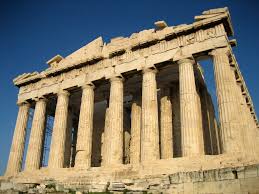中文词源
Greek 希腊
来自拉丁语Graeci, 希腊,种族名。可能来自gray, 灰白色,因原居住于海边岩石地而命名。
英语词源
- Greek (n.)
- Old English Grecas, Crecas (plural) "Greeks, inhabitants of Greece," early Germanic borrowing from Latin Graeci "the Hellenes," apparently from Greek Graikoi. Aristotle, who was the first to use Graikhos as equivalent to Hellenes ("Meteorologica" I.xiv), wrote that it was the name originally used by Illyrians for the Dorians in Epirus, from Graii, native name of the people of Epirus.
But a modern theory (put forth by German classical historian Georg Busolt, 1850-1920), derives it from Graikhos "inhabitant of Graia" (literally "gray," also "old, withered"), a town on the coast of Boeotia, which was the name given by the Romans to all Greeks, originally to the Greek colonists from Graia who helped found Cumae (9c. B.C.E.), the important city in southern Italy where the Latins first encountered Greeks. Under this theory, it was reborrowed in this general sense by the Greeks.
The Germanic languages originally borrowed the word with an initial "-k-" sound (compare Old High German Chrech, Gothic Kreks), which probably was their initial sound closest to the Latin "-g-" at the time; the word was later refashioned. From late 14c. as "the Greek language." Meaning "unintelligible speech, gibberish, any language of which one is ignorant" is from c. 1600. Meaning "member of a Greek-letter fraternity" is student slang, 1884.It was subtle of God to learn Greek when he wished to become an author -- and not to learn it better. [Nietzsche, "Beyond Good and Evil," 1886]
- Greek (adj.)
- late 14c., "of Greece or its people," from Greek (n.). Earlier Gregeis (c. 1200), from Old French Gregois; also Greekish (Old English Grecisc). From 1540s as "of the Greek language;" 1550s as "of the Eastern Church." From 1888 as "of Greek-letter fraternities." In venery, "anal," by 1970. Greek fire "inflammable substance invented 7c. by Callinicus of Heliopolis and used by the Byzantines (who in the Middle Ages were known as 'Greeks')" is from c. 1400, earlier Grickisce fure (c. 1200). Greek gift is from "Æneid," II.49: "timeo Danaos et dona ferentes."
权威例句
- 1. Latin and Greek will be squeezed out of school timetables.
- 拉丁语和希腊语将退出学校的课程表。
- 2. He had a strong Greek nose and olive-black eyes.
- 他有一个高挺的希腊式鼻子和一双墨橄榄绿色的眼睛。
- 3. The Greek government today gave the go-ahead for five major road schemes.
- 希腊政府今天批准了5项重大的道路修建方案。
- 4. Greek yogurt contains much less fat than double cream.
- 希腊酸奶比高脂浓奶油所含脂肪要少得多。
- 5. In the Greek general election, the New Democracy party has claimed victory.
- 新民主党在希腊大选中获胜。

